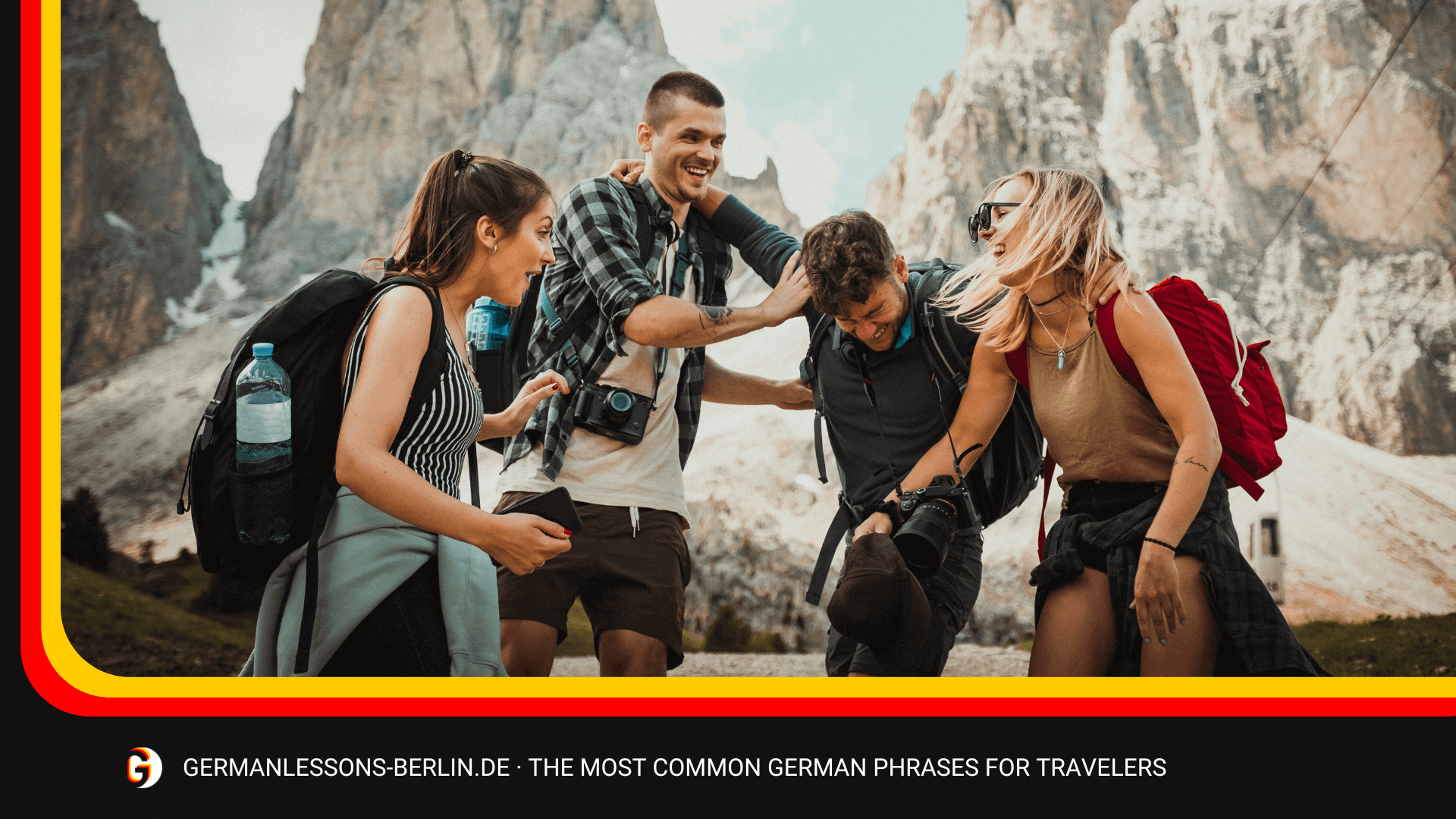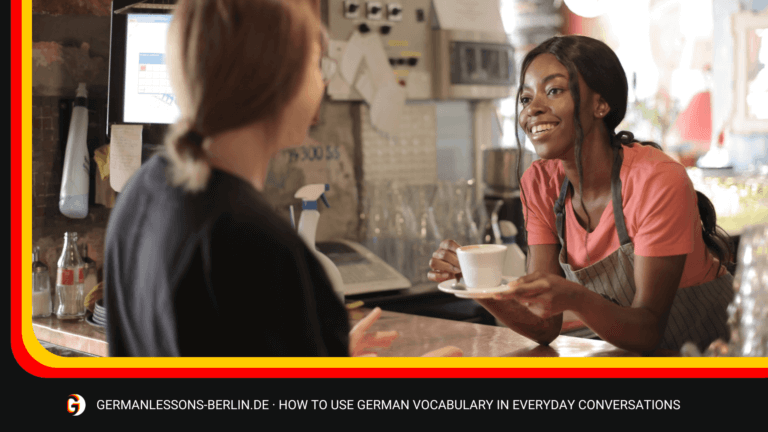Are you ready to explore the beautiful country of Germany? Whether it’s your first time visiting or you’re a seasoned traveler, having some basic German phrases under your belt can make all the difference in enhancing your experience. From navigating public transportation and asking for directions to ordering at restaurants, having a few key phrases will help unlock the full potential of this amazing destination – allowing you to immerse yourself fully in its culture!
In this article, I’ll be sharing with you the most common German phrases that every traveler should know before embarking on their journey. With these useful words and expressions, you’ll have no problem communicating with locals during your travels. So without further ado, let’s dive into what might just be the best part of any adventure – learning how to communicate!
Finally, I won’t only provide you with an overview of important German language basics but also offer helpful tips on how to remember them better so that they become second nature once you arrive in Germany – helping you feel confident when interacting with locals. Are you ready to get started? Let’s go!
Table of Contents
Basic Greetings And Conversation Starters
Traveling to Germany can be a daunting task. But, with the help of this guide, you’ll have no problem knowing what to say in any situation! Here are some basic German phrases for travelers that will make your experience much smoother and more enjoyable:
For formal introductions, it’s best to start off by saying “Guten Tag” (Good Day!) or “Hallo” (Hello!). If you want to get into small talk right away, ask how the other person is doing using the phrase “Wie geht es Ihnen?”(How are you?). To keep up polite conversation, use phrases like “Es freut mich Sie kennenzulernen” (Pleased to meet you), or “Ich hoffe Sie haben einen schönen Tag” (I hope you have a nice day). These simple conversation starters should serve as enough icebreakers to get the ball rolling and let your journey begin!
Now that we’ve covered the basics of starting conversations in German, let’s move on and look at general questions and responses.
General Questions And Responses
Now that we have gone over the basics of common German phrases for travelers, let’s move to general questions and responses. It is important to familiarize yourself with these when traveling in Germany so you can ask locals questions while also being able to respond appropriately. Knowing how to properly interact with local cultural customs will make your trip more enjoyable and memorable.
The phrase “Wie geht’s?” is a great one for travelers to know as it means “how are you?” In response, an appropriate reply would be “Gut danke, und dir?” which translates to “Good thanks, and you?” If someone asks you if there is anything they can do for you, responding with “Nein danke! Alles gut!” (No thank-you! Everything good!) is polite and direct. Other commonly used questions in Germany include: Woher kommst du? (Where are you from?) or Wohin fahren Sie? (Where are you going?). The answers should coincide with where you actually come from and where your destination is respectively.
In addition, learning some key words such as bitte (please), danke schön (thank-you very much) or Entschuldigung (excuse me) will help create positive interactions between both parties throughout your travels in Germany. Having basic knowledge of the language on top of understanding its culture will ensure smoother conversations during your stay in the country. With this information at hand, embarking on any journey around Germany — whether it be sightseeing or meeting new people — becomes easier and far less intimidating. Now let’s take a look at travel-related phrases that may prove useful along the way…
Travel-Related Phrases
Traveling to a foreign country can be both exciting and intimidating. You want to be able to communicate your needs, but you may not know the language or cultural customs of the new place. To help ease those worries, here are three essential phrases for travelers:
- Guten Tag: Meaning ‘Good day’ this is one of the most common greetings used in Germany.
- Wie komme ich nach…?: This phrase translates as ‘How do I get to…?’ and will help you find your way around when traveling by public transport.
- Bitte schön: Use this phrase whenever someone has done something for you such as carrying your luggage or given directions. It means ‘you’re welcome’ in German!
Having these travel-related phrases at hand can make all the difference in having an enjoyable experience while abroad. With just a few key words, you’ll be ready to navigate any city with confidence and discover what Germany has to offer without feeling lost or overwhelmed – no matter how far away from home it feels!
Shopping Vocabulary
When it comes to shopping in Germany, there are a few key phrases and terms you need to know. To start off with the basics, “Wo gibt es das?” means “Where can I find this?” This is an important phrase when asking shopkeepers for help finding something specific. You’ll also want to be prepared with payment terms like “Kann ich mit Kreditkarte zahlen?” which translates as “Can I pay by credit card?”. Bargaining is not common in German stores, so don’t expect any discounts unless they are advertised already.
If the store has multiple items of the same type on display, you may need to ask them how many different kinds they have – use the phrase “Haben Sie mehrere Arten von diesem Produkt?” (Do you have several types of this product?). When asking about prices or sizes, remember to add “bitte” after each question – this acts as a polite request for information. Finally, if you’re looking for particular brands or products that aren’t readily available, try using the phrase “Können Sie mir helfen etwas zu finden?”, meaning “Can you help me find something?” This will often lead to helpful responses from shopkeepers.
Restaurant Vocabulary
John and Mary were excited, as they had just arrived in Germany. They decided to try out a local restaurant for dinner and explore the menu items. As soon as they sat down at their table, John pulled out his phrasebook to brush up on some restaurant vocabulary before ordering food. He quickly learnt about all of the different options available – from appetizers to desserts – and was able to describe them using words like “köstlich” (tasty) or “verlockend” (irresistible).
When it came time to order, Mary asked the waiter if she could get her steak medium-rare instead of well done. Upon hearing that she wanted something “medium gebraten”, he nodded with understanding and went off to place the order. Thanks to their newfound knowledge, John and Mary were able to enjoy their meal without any problems!
They left feeling satisfied after such a successful dining experience; thanks to learning essential German phrases related to food descriptions beforehand, they were able to navigate through the menu easily and order exactly what they wanted. With this useful language under their belt, John and Mary felt ready for whatever else their journey may bring…
Accommodation Terms
When traveling to Germany, knowing the basic phrases for accommodation is essential. From hotel bookings to guest houses and hostel bookings, these terms can help you find a place to stay in this beautiful country. Here are some of the keywords that will come in handy:
| German | Pronunciation | English Translation |
|---|---|---|
| Hotelbuchung | HOH-tel-boo-kuhng | Hotel booking |
| Hostelbuchung | hohs-tel-boo-kuhng | Hostel booking |
| Gästehaus | ges-teh-howss | Guest house |
| Zimmerpreis | tsimer-prize | Room rate |
Using these terms when making your travel arrangements can make it easier to get around and find what you need quickly. For example, if you want a room with a view or one with extra amenities, asking for “Zimmerservice” would give you access to those options. Additionally, understanding how to ask about rates and availability (in German) could save time and money on your trip! With just a few simple words, travelers can be well prepared for their journey ahead.
Emergency Situations
Now that you’ve found a place to stay, it’s important to know some emergency phrases in case of an unexpected situation. Knowing the right words can be invaluable if you need help from locals or medical assistance. Here are some useful German phrases for any emergency:
- To call the police – „Die Polizei rufen“
- For medical assistance – „Medizinische Hilfe“
- If someone needs help – „Hilfe brauchen“
In an emergency, always have your country’s embassy phone number on hand, as well as other emergency contacts like local hospitals and doctors. You may also want to check with your accommodation before leaving to find out which services they offer during emergencies. Getting familiar with local emergency services is also recommended, so you’re prepared just in case something happens while traveling overseas.
No matter how careful we try to be, sometimes accidents happen when traveling abroad and it pays off to be ready for them. So make sure you’re up-to-date on all essential German phrases related to emergency situations and don’t forget those important contact numbers! With these key phrases and useful tips under your belt, you’ll feel much more secure knowing that help is within reach should anything unexpected occur. Now let’s move on to learning about directions and transportation in Germany!
Directions And Transportation
One interesting statistic to note is that most Germans use public transportation as their primary method of getting around. Whether it be the famous Deutsche Bahn train system, city buses or other forms of travel like bicycles and scooters, there is plenty of options for travelers in Germany.
For those who prefer a more private mode of transportation, rental cars are widely available throughout the country. Driving through some German cities can be very challenging due to traffic patterns and limited parking spots so make sure you plan your route beforehand! Additionally, taxi services are also an option for visitors seeking convenient transport from one place to another.
When traveling on public transportation such as trains or subways in Germany, tickets must be purchased ahead of time. Most ticket machines accept cash or card payments but if you’re having trouble figuring them out then don’t hesitate to ask a local for help! With all these different modes of transport accessible at your fingertips you’ll have no problem navigating Germany’s roads with ease.
As we move forward into our exploration of cultural customs and etiquette in this fascinating country, let us take what we have learned about directions and transportation with us – knowledge that will serve us well as we explore all that Germany has to offer!
Cultural Customs And Etiquette
Navigating the cultural customs and etiquette of any foreign country can be an intimidating prospect for visitors, but Germany has a long history of welcoming people from all over the world. By taking time to understand some common German social behavior and norms, you’ll have a much smoother travel experience.
When out in public places like stores or restaurants, it’s important to remember that Germans generally operate on punctuality – so don’t be surprised if someone looks at you strangely when you’re late! Additionally, while many other countries are now becoming more casual with their dress codes, it’s still considered polite to dress smartly in most professional settings in Germany.
Germans also tend to speak more formally than Americans do – especially in business contexts – so make sure to use formal language whenever you interact with strangers. Another important point is that Germans often take conversations quite literally and may not pick up on jokes or sarcasm as quickly as others would. This doesn’t mean they lack humor; just exercise caution before cracking wise around new acquaintances!
Overall, by keeping your eyes open and respecting the local culture wherever you go, you should have no trouble acclimating yourself to life in Germany as a visitor. From there, getting acquainted with common German slang will become even easier!
Common German Slang
Traveling to Germany can be an exciting experience – especially when you’re ready to explore the country’s unique culture and language. From regional dialects and colloquial speech, German slang is a must-know for anyone wanting to get around with ease.
To add some color and personality to your conversations, try out some of these popular german slang expressions! ‘Hamma’ or ‘Dit iss hamma’ are both phrases used in certain parts of Germany meaning ‘This is great!’ if something fun or cool happens. If you want to say ‘That was really awesome’, then use the phrase ‘Dat war echt der Hammer’ which literally translates as ‘that was the hammer’ but means it was super cool.
When talking about people, calling someone a ‘Schlawiner’ usually implies that they’re mischievous or sly – so only use this one when appropriate! And finally, there’s a saying often used between friends; ‘Könntest mir mal wieder über den Weg laufen’ meaning ‘I haven’t seen you in ages’. It can be used as a greeting or simply express how long it has been since you last caught up.
So next time you find yourself in Germany, don’t forget to give these slang phrases a go! They will bring life into any conversation and make sure you have plenty of memorable experiences along the way.
Frequently Asked Questions
What Are The Best Cities To Visit In Germany?
If you’re looking for the best cities to visit in Germany, look no further! From lively Berlin and beautiful Munich to quaint Freiburg and impressive Cologne, there’s something for everyone. Whether you want to explore a vibrant city or take a peaceful stroll through rural towns, Germany has it all.
When planning your trip, here are some of the top cities in Germany that should be on your list:
Berlin: Known as one of Europe’s most exciting cities, Berlin is full of culture and history. With world-class museums, galleries, and theatres, plus trendy bars and restaurants – Berlin never fails to impress visitors.
Munich: Bavaria’s capital city offers plenty of attractions including beer gardens, historical sites such as Marienplatz Square, stunning churches like Frauenkirche Cathedral, and iconic landmarks like The Olympiapark. Plus don’t forget Oktoberfest which takes place every year in late September/early October!
Cologne: This charming Rhine River City boasts several unique attractions such as its UNESCO World Heritage Site Old Town Hall (Altes Rathaus) and the incredible Great St Martin Church (Gross St Martin). Select stores also offer shopping lovers an array of retail therapy opportunities.
Whether you want to experience German culture firsthand or just kick back with friends while exploring the sights – each city offers something special that will make your holiday unforgettable. So why not take the plunge & embark on a journey around these magnificent German cities? It promises to be an adventure filled with memories that will last a lifetime!
What Is The Cost Of Living In Germany?
When it comes to the cost of living in Germany, there are a lot of factors you need to consider. Living costs vary depending on where you live and what your lifestyle is like. German living expenses can range from inexpensive to quite pricey, but overall the cost of living in Germany is relatively affordable compared to other countries in Europe.
One thing that contributes to the cost of living in Germany is rent prices. Depending on the city or town you’re looking at, rents can be expensive – particularly in major cities such as Berlin and Munich – but they tend to be more reasonable than in some other European cities. If you’re planning on staying for longer periods of time, many landlords offer discounts for long-term rentals.
In addition, food prices in Germany are usually quite low when compared with those found elsewhere in Europe. Grocery stores have great deals, so if you plan ahead and buy enough groceries for a few days at a time, it’s easy to keep your grocery bill down. Eating out may also be an option if you don’t mind spending a bit more money; however, most restaurants have fairly reasonable prices too!
All things considered, while the cost of living in Germany will depend largely on how much you want to spend and what type of lifestyle you prefer, overall it’s still possible to find reasonably priced accommodation and food without breaking your budget. With careful planning and smart financial decisions, anyone can make their stay in Germany enjoyable no matter their budget!
What Type Of Visa Do I Need To Enter Germany?
Traveling to Germany can be a liberating experience, full of new and exciting experiences. But before you begin your journey, it is essential that you know what type of visa you need in order to enter the country.
It is important to understand the different types of visas available when planning a trip to Germany. Depending on where you are traveling from, different visa requirements may apply. For example, if you are coming from another European Union country, then no visa is required for entry into Germany. However, if you are coming from outside the EU or Schengen area, then obtaining a German travel visa becomes necessary.
The most common type of German visa is the short-term tourist or business visitor’s visa which allows travelers to stay in Germany for up to 90 days within any 6-month period. This type of visa must be applied for at least two weeks prior to the departure date and requires valid proof of funds as well as other documents such as passport photos and an itinerary outlining plans for the duration of one’s visit to Germany. Additionally, depending on the length and purpose of stay in Germany there are also student visas and long-term residence permits available for those who plan on staying longer than three months.
It is clear that understanding all applicable visa regulations ahead of time will help ensure a stress-free international adventure! Planning ahead by researching applicable rules and regulations can save time and energy while allowing more time to enjoy all that this amazing destination has to offer!
What Are The Most Popular Tourist Attractions In Germany?
When it comes to tourist attractions in Germany, there are plenty of amazing places to visit. From the iconic Berlin Wall and Neuschwanstein Castle to the Black Forest and Hamburger Dom, you’re sure to find something that appeals to your sense of adventure. Here’s a quick list of must-see German sights:
The Berlin Wall – A one-of-a-kind historical experience that still stands as a reminder of past division.
Neuschwanstein Castle – This beautiful 19th-century castle is located near Munich and has captivated audiences for over 150 years with its fairytale architecture.
Reichstag Building – Once the seat of the German Parliament, this building now serves as a popular attraction where visitors can view its stunning glass dome from below or take an elevator ride up for a bird’s eye view of Berlin.
As you explore these fascinating destinations, you’ll have endless opportunities to make memories that will last a lifetime. Get ready to be wowed by spectacular views, interesting history lessons, and unique cultural experiences! You won’t want to miss out on all the fun activities available at each destination either – think mini golfing in the Black Forest or sampling traditional dishes at Hamburg’s famous fish market.
So if you’re looking for an unforgettable vacation full of exploration and excitement, then Germany should definitely be at the top of your travel bucket list! Whether you choose to stay in one city or hop around them all, you’re sure to have an incredible time discovering what Germany has to offer!
How Can I Learn More About German Culture And History?
As a traveler, discovering the culture and history of Germany is an essential part of understanding this beautiful country. Learning about German culture can be achieved through various language learning activities, cultural exchange programs, and visiting historical sites.
I recently found myself looking for ways to learn more about the fascinating German culture and history. I stumbled across several options that would help me gain insight into this unique country’s heritage. For example, there are language-learning courses available online or in person that allow you to develop your conversational skills with locals. Additionally, there are cultural exchange programs where you can participate in activities like cooking traditional dishes or exploring local markets. Finally, there are countless historical sites around Germany that provide visitors with the opportunity to explore its past firsthand.
These experiences have proved invaluable when it comes to gaining knowledge of German culture and history as they all offer different perspectives which create a well-rounded experience. Not only did these opportunities give me a great overview but also allowed me to make meaningful connections as I was able to interact directly with people from the area who could share their own stories and insights into life in Germany!
Conclusion
Visiting Germany is an incredible experience that you won’t forget. From the beautiful cities to the rich history, there really is something for everyone in this country. To make sure your trip goes as smoothly as possible, it’s important to have a few basic German phrases at hand.
Knowing how to say hello and thank-you can go a long way when navigating around Germany and communicating with locals. It also doesn’t hurt to learn some key phrases such as “how much does it cost?” or “where is the nearest bus stop?”. Learning these simple yet useful words will help ensure a successful and enjoyable stay in Germany!
So why not take some time before your trip to learn a few common German phrases? You’ll be glad you did when you’re out exploring all of what this amazing country has to offer! After all, wouldn’t you rather enjoy chatting with the locals instead of being lost in translation?








